Justin Taylor's Blog, page 278
October 10, 2011
What Do We Mean When We Say the Fetus Is a "Person"?
 Francis Beckwith explains:
Francis Beckwith explains:
According to the substance view, the human being is a particular type of living organism—a rational moral agent—that remains identical to herself as long as she exists, even if she is not presently exhibiting the functions, behaviors, or current ability to immediately engage the activities that we typically attribute to active and mature rational moral agents.
Because the human being is a rational moral agent, she is a person of intrinsic moral value as long as she exists.
When I say that the fetus is a person I mean to say that she is just as much a bearer of rights as any person whose rights-bearing status is uncontroversial, e.g., her mother, you, or me. That is, the fetus is entitled to all the rights to which free and equal persons are entitled by virtue of being free and equal persons.
So, for example, one cannot deprive the standard fetus of her life without the sort of justification we would expect if we were depriving a standard ten-year-old of his rights.
To illustrate, if it is wrong to kill a ten-year-old as a result of taking his kidneys and giving them to people the government thinks will benefit society (e.g., scientific geniuses on the verge of curing cancer or AIDS), it is wrong to kill a 20-week-old fetal-clone as a result of taking his kidneys and giving them to his genetic progenitor, a scientific genius, who needs them to survive so that he may continue his work on cures for cancer and AIDS.
From Francis J. Beckwith, "The Human Being, a Person of Substance," in Persons, Moral Worth, and Embryos: A Critical Analysis of Pro-Choice Arguments, ed. Stephen Napier (Dordrecht: Springer, 2011), 67-83; emphasis added.
For further philosophical defense of this position, see Beckwith's Defending Life: A Moral and Legal Case Against Abortion Choice (CUP, 2007) and George's and Tollefsen's Embryo: A Defense of Human Life (Doubleday, 2008). For a more popular-level explanation, see Klusendorf's The Case for Life: Equipping Christians to Engage the Culture (Crossway, 2009).
William Tyndale and the King James Version
Computer analysis has revealed that more than three quarters of the King James Version can be traced directly to Tyndale (83% of the NT and 76% of the OT). . . . The King James Version is sometimes called 'the greatest book written by committee.' And I suppose there is something to celebrate about that. Yet, for the most part, those 47 scholars, working in peace and prosperity, could not improve on the work of a young evangelical who gave his liberty and his life for the gospel.
For a biography of the man, see David Daniell's William Tyndale: A Biography. (John Piper says this biography is one of the best he's ever read of any person.)
HT: Andrew Sullivan
The Mother of Many Theological Errors
In 1989 Clark Pinnock penned a surprisingly transparent statement regarding his rationale for his pilgrimage from Calvinism to open theism, referring to "the doctrinal moves that logic required and I believed Scripture permitted me to make" (my emphasis).
It's a temptation many of us face and which we should all resist.
Faith in America: The Role of Religion in the Public Square
An hour-and-a-half discussion between Robert P. George and Russell D. Moore at Princeton University.
HT: Frank Beckwith
Why Read John Owen? What to Read?

Painting by Zach Frazen (atozach.com)
"To read John Owen is to enter a rare world. Whenever I return to one of his works I find myself asking 'Why do I spend time reading lesser literature?' . . . If we can persevere with his style (which becomes easier the longer we persevere), he will not fail to bring us to the feet of Jesus."
—Sinclair B. Ferguson
"I owe more to John Owen than to any other theologian, ancient or modern; and I owe more to The Mortification of Sin than to anything else he wrote."
—J. I. Packer
"Owen is extraordinary. Owen is simply extraordinary. He is in a class, Packer says, with Augustine, Luther, Calvin, Edwards—that rarefied top 10 thinkers and pastors in the world. John Owen knows the soul, knows Christ, knows communion with Christ like very few others.
—John Piper
"Dr. Lovelace, in his Basic Dynamics course at Gordon-Conwell, made us read On Temptation and On Mortification. And that's where I discovered John Owen in 1972. . . . I wouldn't be in the ministry—my life would be a shipwreck—if I hadn't read that book."
—Tim Keller
"Apart from the Bible, I have found John Owen's writings to be the best books ever written to help me stop sinning the same old sins."
—Philip Graham Ryken
You can get Owen's 16-volume Works (reprinted from the mid-19th century). But that's certainly not for everyone's budget or reading tastes.
If you would like to read Owen's actual writings (not a paraphrase) with additional editorial help and explanation and introduction, I would recommend the following works published by Crossway and Christian Focus (full disclosure: I co-edited the Crossway ones). They keep Owen's language but make some cosmetic adjustments (e.g., changing the archaic verbs from "hath" to "has"), translate the Latin, provide headings and footnotes, etc.
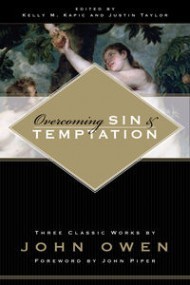 1. Overcoming Sin and Temptation. There are three books in this volume:
1. Overcoming Sin and Temptation. There are three books in this volume:Mortification of Sin
Temptation
Indwelling Sin
You can read this entire book online for free. Many of the quotes above are in reference to the book Mortification in particular.
Jerry Bridges writes: "John Owen's treatises on Indwelling Sin in Believers and The Mortification of Sin are, in my opinion, the most helpful writings on personal holiness ever written."
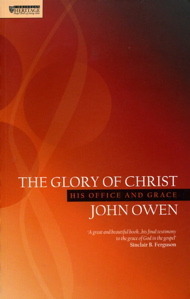 2. The Glory of Christ. This is the last work Owen wrote—in his essence, his dying words about the subject he cared for most deeply.
2. The Glory of Christ. This is the last work Owen wrote—in his essence, his dying words about the subject he cared for most deeply.On August 22, 1683, at his home in Ealing, Owen dictated his last surviving letter to his long-time friend, Charles Fleetwood:
I am going to him whom my soul hath loved, or rather hath love me with an everlasting love; which is the whole ground of all my consolation. The passage is very irksome and wearisome through strong pain of various sorts which are all issued in an intermitting fever. All things were provided to carry me to London today attending to the advice of my physician, but we were all disappointed by my utter disability to understand the journey. I am leaving the ship of the church in a storm, but while the great Pilot is in it the loss of a poore under-rower will be inconsiderable. Live and pray and hope and waite patiently and doe not despair; the promise stands invincible that he will never leave thee nor forsake thee. (Toon, The Correspondence of John Owen, 174)
Two days later Owen's friend William Payne, who was overseeing the printing of The Glory of Christ, paid him a visit, assuring him that all was going well with the publication. Owen responded:
I am glad to hear it; but O brother Payne! The long wished-for day is come at last, in which I shall see the glory in another manner than I have ever done, or was capable of doing in the world.
You can read online for free Ferguson's introduction.
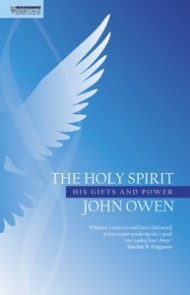 3. The Holy Spirit. Of this work J. C. Ryle said: "'I assert unhesitatingly that the man who wants to study experimental theology will find no books equal to those of Owen for complete Scriptural and exhaustive treatment of the subjects they handle. If you wish to study thoroughly the doctrine of sanctification I make no apology for strongly recommending Owen on the Holy Spirit." As Sinclair Ferguson says, "There are, Francis Bacon wrote, some few books which we should 'read, mark, learn and inwardly digest.' Owen on the Holy Spirit is one of them."
3. The Holy Spirit. Of this work J. C. Ryle said: "'I assert unhesitatingly that the man who wants to study experimental theology will find no books equal to those of Owen for complete Scriptural and exhaustive treatment of the subjects they handle. If you wish to study thoroughly the doctrine of sanctification I make no apology for strongly recommending Owen on the Holy Spirit." As Sinclair Ferguson says, "There are, Francis Bacon wrote, some few books which we should 'read, mark, learn and inwardly digest.' Owen on the Holy Spirit is one of them."Read for free Ferguson's introduction and Owen's preface.
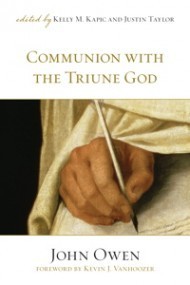 4. Communion with the Triune God. Of this one, John Piper writes: "Among English-speaking theologians and pastors, John Owen and Jonathan Edwards run neck and neck for the first place in profound, faithful, fruitful displays of the glory of God in the salvation of sinners. Not only that, they are both running for first among the ranks of those who show practically how that glory is experienced here and now. Owen may have the edge here. And Communion with the Triune God is his most extraordinary effort. No one else has laid open the paths of personal fellowship with the three persons of the Trinity the way Owen does. What an honor it would be to God if more of his children knew how to enjoy him the way Owen does."
4. Communion with the Triune God. Of this one, John Piper writes: "Among English-speaking theologians and pastors, John Owen and Jonathan Edwards run neck and neck for the first place in profound, faithful, fruitful displays of the glory of God in the salvation of sinners. Not only that, they are both running for first among the ranks of those who show practically how that glory is experienced here and now. Owen may have the edge here. And Communion with the Triune God is his most extraordinary effort. No one else has laid open the paths of personal fellowship with the three persons of the Trinity the way Owen does. What an honor it would be to God if more of his children knew how to enjoy him the way Owen does." You can read online for free Kevin Vanhoozer's foreword, A Note on This Edition, Preface, Chapter 1, and Glossary.
(Christian Focus also has a version of this one. You can read for free Fergsuon's introduction and the first chapter by Owen.)
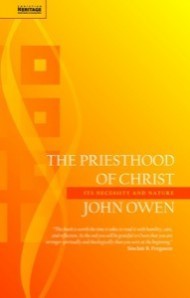 5. The Priesthood of Christ. Ferguson writes, "Probably no theologian in English language has ever rivaled Owen stressing the absolute centrality of Christ's penal substitution and therefore his as Priest. . . . For that reason alone The Priesthood of Christ is worth all the time it takes to read it with humility, care, and reflection."
5. The Priesthood of Christ. Ferguson writes, "Probably no theologian in English language has ever rivaled Owen stressing the absolute centrality of Christ's penal substitution and therefore his as Priest. . . . For that reason alone The Priesthood of Christ is worth all the time it takes to read it with humility, care, and reflection."This material is from an "excursus" (!) in Owen's massive seven-volume commentary on the book of Hebrews.
You can read online for free Ferguson's introduction and Owen's first chapter.
WTSBooks sells the four Christian Focus paperbacks as a set at a 30% discount.
They have set up a special code for one-week only: type in OWEN at checkout and you can get an extra $2 off The Priesthood of Christ and an extra 10% off the set.
Can Evangelicals Support a Mormon for President? Is Mormonism a Cult?

It's important to remember that the two questions above are distinct questions, though they may be interrelated.
Pete Wehner has a nice two-sentence summary of the controversy incited by prominent SBC pastor Robert Jeffress:
Jeffress has created quite a stir by declaring Mormonism is a "cult" and because Mitt Romney is a Mormon, evangelical Christians should support Texas Governor Rick Perry over the former Massachusetts governor. That's not the only reason evangelical Christians should support Perry over Romney, Jeffress argued, but it's a key one.
Wehner goes on to critique "the Jeffress Standard" (that religious beliefs should trump competence when it comes to selecting a president). Wehner's case against that view is sound, it seems to me (though we would do well to retire the apocryphal Luther quote he cites).
On the other hand, evangelicals would be wise at least to consider—even if they ultimately reject—the arguments set forth here by Warren Cole Smith.
But apart from the political questions, there's the underlying truth question: should we refer to Mormonism as a "cult"?
Denny Burk cites a helpful distinction:
In her book Another Gospel (p. 17), Ruth Tucker suggests at least three different ways to define a cult: sensational/popular approach, a sociological approach, or theological approach.
The sensational/popular approach is based on media accounts of bizarre religious behavior.
The sociological approach focuses on the authoritarian, manipulative, totalistic and sometimes communal features of cults.
The theological definition focuses on deviation from some standard of orthodox Christian belief. Popular culture tends to define the term using the sensational approach, while evangelicals typically define the term according to the theological approach. (My emphasis.)
Burk goes on to sketch some of the theological differences between Mormonism and historic, orthodox Christianity, and then wisely concludes as follows:
Maybe cult isn't the best communicative term since so many people only think of the sensational and sociological approaches. It's the concept, not the term, that matters most. If someone wants to call it "organized heterodoxy" that's fine—but I doubt the term will stick! The important thing to emphasize is that Mormonism is not Christianity.
When Christians use the term, we need to be clear about what we mean. We need to be careful not to use the term because we want to score points for this or that agenda, but because we love our lost neighbors and we want to focus attention on the only message that can save them—the biblical gospel of Jesus Christ crucified and raised for sinners. And that message is for anyone who will have it—including Mormons (Revelation 22:17).
The whole post is worth reading.
October 9, 2011
Martin Luther
From the BBC "Empires" series (which you can watch for free on Amazon Instant Video with Prime), here is the second part of their two hour feature on Luther. The commentary has a bias toward explaining his legacy in terms of individuals standing against authority, but it's still a helpful piece giving an overview of some key points in his life:
October 8, 2011
How to Ask a Good Question
Good counsel from a Socratic teacher.
"God's Own Fool," by Michael Card
Proverbs, of course, focuses in on the issue of wisdom—but the New Testament reveals that walking in wisdom is more than simply making good decisions; instead, walking in wisdom means walking according to the One who is "the power of God and the wisdom of God," Jesus Christ (1 Cor. 1:24b).
But the way of Jesus doesn't look wise to the world. That's paradox, and that's mystery. And it's the gospel.
In today's episode of "The Cross and the Jukebox" I talk with my favorite singer-songwriter, Michael Card, about his song, "God's Own Fool." It's a song that stays with me all the time, because it's a song that indicts me in a lot of ways. It's a song that's changed me, and is constantly changing me; it's a song that helped crucify my rationalism.
It's true, as Mike sings: "The power of paradox opens your eyes, and blinds those who say they can see."
You can listen here.
The music can be found on this album.
October 7, 2011
Justin Taylor's Blog
- Justin Taylor's profile
- 44 followers




